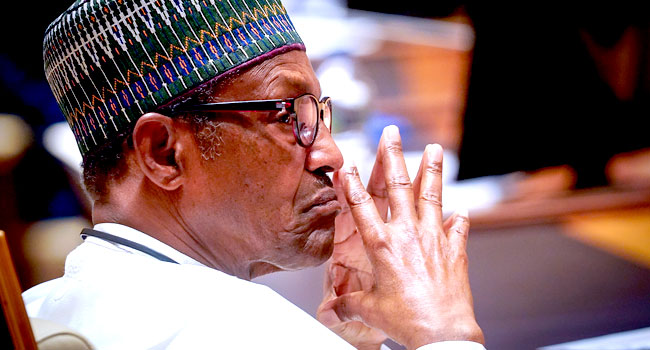Sustaining Buhari’s legacy: Insecurity, economy and corruption
President Buhari’s last-ever Christmas Day message to Nigerians included a call for people to vote for the person that will sustain his legacy. Given the economy’s current condition, many would agree that the timing of the statement was not well-thought. Legacy, by definition, is a situation that has developed because of past actions and decisions. […]

President Muhammadu Buhari
President Buhari’s last-ever Christmas Day message to Nigerians included a call for people to vote for the person that will sustain his legacy. Given the economy’s current condition, many would agree that the timing of the statement was not well-thought.
Legacy, by definition, is a situation that has developed because of past actions and decisions. Buhari’s administration was voted into office to leave a legacy on three things only. Solving Nigeria’s insecurity within six months – he only has five months to leave office now – fixing the economy and getting rid of corruption.
He is desperate to leave a legacy, and it is almost impossible to achieve one. If Buhari cannot cement his legacy, he will not find anyone to help him. So, I will not be surprised if he keeps repeating the message at every opportunity. According to the president himself, those he appointed to highlight his legacies are not doing so.
Let’s be clear; the current condition of Nigerians is not desirable, and even the unborn children are affected. The economic condition of the people is bad in all aspects. The economic conditions of the people, especially during the festive seasons when people meet to reflect with family and community members, are worrying.
The situation is not restricted to goods for the festive season. Prices of essentials keep rising. The persistent fuel scarcity has pushed transportation fares, making it difficult for people to travel to their hometowns to celebrate Christmas and the New Year holidays. It is reported that shopping for the festivity has declined in market squares.
Under Buhari, the insecurity and terror disturbances have expanded from three states in the North East to the whole of Nigeria. Killings and murders of innocent citizens have increased across the country. Bandit terrorists have become tax collectors. Communities are ransacked. People were conditioned to put a specific religion and ethnic group on trial instead of the perpetrators and the government. His response to these disturbances and the irrational policy of closing the borders was to laugh at the farmers who could not farm and suggest they were not hungry enough to work on the farm.
Experts warned the Buhari administration about the danger that borrowing for consumption and printing more of the naira would inflate the currency. Their warnings were ignored. Inflation exploded, and the administration is in denial. Buhari blamed the economy’s precarious condition of the country on lazy youths. Buhari may not be corrupt, but he has allowed those close friends to accumulate public resources. One embarrassing episode is that of the Minister of Justice, who the Nigerian Governors Forum accused of fraud for insisting on paying $418 million to private consultants as a percentage of Paris Club refunds from funds belonging to the states.
Buhari is that carpenter who climbs your leaky roof to fix only three holes. After eight attempts to patch them by changing some roofing materials, he created more holes than he met. He went on to blame you for all his misadventures, then asked you to sing praises for him before he came down the ladder and also hire someone who will continue what he did in his eight previous attempts.
Nigeria is like a room with a leaky roof. The only legacy Buhari will leave is to make it stop leaking. But again, he told us he had done his best.
In a normal situation, many people will not pay attention to Buhari’s Christmas message, and even those who do will have a reason to justify why the president said it. But we are not in a normal situation. The Nigeria Labour Congress president described it as dark times for Nigerians. People are going through economic hardship due to Buhari’s administration’s past actions and decisions – Buhari’s Legacy. People are angry because they know the government is not doing anything to improve it. The silver lining in the dark cloud of Buhari’s festive message united two opposition spokespeople against the ruling party’s spokesman during a television debate. Their comments reflected the opinions of the wider public – unhappy and unsatisfied.
An apology for ongoing hardship would have divided opinions and might even have brought joy to those who desperately wanted to see Buhari do the right thing, but as expected, he failed to disappoint. He might have lived up to his legend – Mai-Gaskiya. People sometimes adjust, even if they do not admit they are adjusting.
As a continuity candidate, the flagbearer could apologise for the ruling party’s failures. Of course, that will not happen because it goes against the tradition of Nigerian politics. Failure is an orphan, and they all find it difficult to accept. In politics, admitting fault is a rare gesture. High-ranking party members will not openly acknowledge that the government was wrong about anything. Buhari would have had many people taking the credit if he had been a success.
But again, after eight years of promises, the people are uninterested in any apology. They want results. The present is dreadful, and we must look forward. The legacy that people will remember results from actions where insecurity challenges are addressed without compromise and a prosperous economy.
